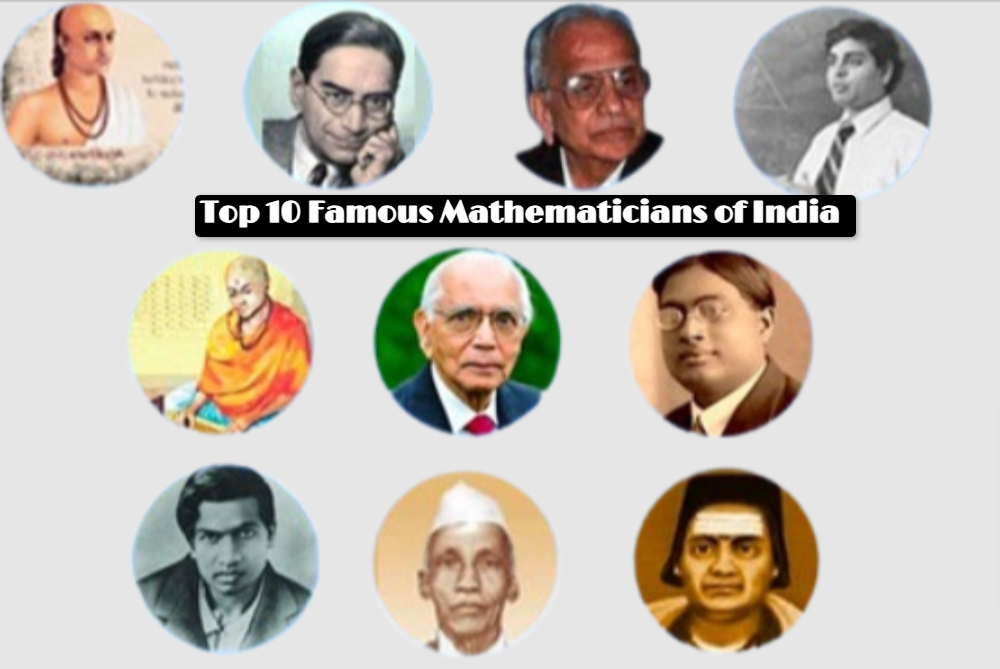We need to recognize the contributions of the mathematicians, who have made a significant contribution to the human race. In our search for global talent, however, we forget that India has also produced some of the greatest mathematicians in history. Do you know them? You probably don’t, right? We’ve compiled a list of 10 of the most famous Indian mathematicians. Let’s start with the list.
1. Srinivasa Ramanujan
Srinivasa, born in Erode in India in 1887, is our first choice. Imagine yourself being able to impress a top British mathematician by writing a single letter. Ramanujan is here to introduce himself! He was a man of extraordinary intelligence and innate mathematics, even though he had no formal training in the field. It was a huge deal back then and still is for anyone who reads about Srinivasa Ramanujan. Did you know, after impressing G.H. Hardy went to Cambridge and did groundbreaking work in continuous fractions (fractions that are not divided by zero), number theory, infinite series, etc.
2. Aryabhata
We then visit Aryabhata. A genius, Aryabhata wrote the Aryabhatiya at just 23 years old. This happened in 476 CE. Did you know he was the first person to introduce the concept of zero to the world? Aryabhata, in addition to proposing the Earth rotates on its axis and calculating the duration of the year’s solar cycle, demonstrated his infinite brilliance. His work in trigonometry was exceptional and he revolutionized sine tables mathematics. These are his most important works. It is difficult to believe, but it’s true, that scientists of that caliber existed in India centuries ago.
3. Brahmagupta
Brahmagupta’s work, which was fundamental in astronomy, mathematics and physics, first appeared in 598 C.E. Born in Rajasthan, he codified a revolutionary concept at the time: using zero and negative numbers in mathematics. A masterwork, his “Brahmasphutasiddhanta” introduced techniques for determining the areas of cyclic quadrilaterals and solving quadratic equations, did you already know that? Brahmagupta’s astronomical work, which included the predictions of solar and moon eclipses, had a similar impact and was a masterwork.
4. Bhaskara II
Bhaskara II, or Bhaskaracharya, was a brilliant thinker from an earlier time. He was born in 1114. In his “Siddhanta Shiromani”, he talks about astronomy, mathematics, and calculus. He developed it centuries before famous scientists such as Newton and Leibniz! Bhaskara’s methodical solutions to quadratic, cubic and quartic equations were revolutionary. His mean value theorem, and other calculus discoveries were extremely sophisticated.
5. P.C.Mahalanobis
Prasanta Mahalanobis was born in Kolkata, India, in 1893. The Mahalanobis Distance, a key metric for multivariate analyses, was introduced by him. He is known as the father in Indian statistics. Mahalanobis founded the Indian Statistical Institute which he elevated to the status as a world-renowned center of research. His work with the Planning Commission, and the Second Five-Year Plan highlighted his overall influence on India’s economy.
6. C.R. Rao
Rao, who was born in 1920 and went on to do exceptional work in the fields of statistics theory and application. Rao was born in 1920 and went on to do exceptional work in statistics theory and applications. His contributions to estimate theory, such as the Rao-Blackwell Theorem and Cramer Rao bound, are unquestionably fundamental for contemporary statistics. Rao’s multivariate work is now being used in many fields, including genetics and engineering. Rao’s legacy will last for many years because of all the statisticians Rao mentored.
7. Satyendra Nath Bose
Satyendra Bose was the next person to be mentioned. He was born in 1894 and worked in quantum mechanics. The Bose Einstein statistics he developed with Albert Einstein in the early 1900s had a profound impact on our understanding of quantum particles. He was indeed the famous Indian scientist that worked with Einstein. Bose predicted the Bose Einstein condensate as a new form of matter by using his statistical approach Planck’s equation. Bose’s contributions to theoretical physics, which included the Padma Vibhushan, were acknowledged by various awards later in his life.
8. Shakuntala Devi
Shakuntala’s mind-reading abilities literally shocked the world. She was born in Bangalore, India in 1929. Did you know she achieved a Guinness Book of World Records record when she calculated a 23rd integer root faster than a UNIVAC? Many people became fascinated by mathematics when they saw Devi’s presentations or read her books. Her extraordinary skill opened people’s minds to the infinite power of human thinking. She changed the way people view mathematics for ever.
9. D.R. Kaprekar
Dattatreya Ramchandra Kaprekar or D.R. Kaprekar, or D.R. Kaprekar as it is commonly known, was an independent mathematics who made significant contributions to number theory due to his natural curiosity for this subject. He was born on 1905. His most notable achievement is the Kaprekar constant (6174). Kaprekar’s novel ideas were evident in his research on magic squares and self-numbers. He was not well-known in India but he is respected by the scientific community.
10. Narendra Karmarkar
Let’s not forget another famous Indian mathematician, Narendra Karmarkar, who is still alive. The Karmarkar algorithm, developed by this Indian scientist, is responsible for the revolution in optimization that it sparked. This polynomial time technique for linear programing has surpassed the simpler method in 2024 from engineering to economics.
Conclusion
You’ll learn how highly respected these mathematicians were by the scientific community around the world when you read their stories. They are certainly still inspiration for many in the scientific community to make new advances and discoveries.


